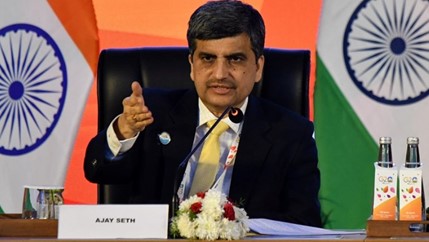
Indian Official Deems EU Carbon Border Tax Unfair and Unacceptable
India has rejected a European Union proposal to impose higher taxes on its carbon-emitting industries, which the 27-member bloc claimed it would offset upon entry of these products into its borders, a senior official told Reuters.
The proposal came from an EU delegation led by Gerassimos Thomas, Director General for Taxation and Customs Union at the European Commission, who defended the suggested carbon border adjustment mechanism (CBAM) during discussions with Indian officials.
Ajay Seth, India's Economic Affairs Secretary, said in an interview with Reuters, "Their proposal is impractical. Their team visited us … the solution they are proposing doesn't suit a developing economy like India."
New Delhi has communicated its position to the EU delegation, describing the proposed CBAM as unfair and harmful to domestic market costs, Seth stated.
Last year, the EU approved the world's first plan to impose tariffs on imports of high-carbon goods, such as steel, aluminum, and cement, with the goal of achieving net-zero greenhouse emissions by 2050.
Negotiations between the EU and India are ongoing at a "technical level," according to an EU statement following the delegation's visit earlier this month.
EU officials are striving to persuade countries like China, South Africa, and India, which have opposed the CBAM.
The European Commission delegation informed India that the primary aim of the carbon tax was not to generate revenue but to ensure the supply of greener products to the EU market.
The EU delegation suggested that India could introduce its own carbon tax to finance improvements in supply chains and reduce carbon emissions while retaining its share of the EU market.
Economic Challenges
Seth pointed out that greening the steel industry would lead to higher costs for the economy, stating, "With income levels that are one-twentieth of those in Europe, can we afford higher prices? No, we can't."
Assuming India does not implement a domestic plan to tax high-carbon production and incentivize lower-carbon methods, the EU plans to start collecting the carbon tax on each consignment of steel and aluminum from January 1, 2026, potentially imposing tariffs of between 20% and 35%, according to industry estimates.
Analysts warn that the impasse over carbon emissions could strain bilateral trade and impact negotiations on a free trade agreement (FTA).
"As India negotiates an FTA with the EU, it should prepare for the scenario where Indian products will be subjected to a high 20%-35% CBAM tax in the EU, while EU products will enter India duty-free," said Ajay Srivastava, founder of the Global Trade Research Initiative (GTRI), a New Delhi-based think tank.
The EU is India's second-largest export destination, with nearly $100 billion in exports in 2023.
Seth emphasized that India wants the EU to adhere to the carbon emission rules agreed upon in the 2015 Paris Agreement, which allowed developing nations like India more flexible emission reduction targets compared to developed countries.
India, with a carbon intensity of 632 grams per KWh in 2022, according to the think tank Ember, is expanding its renewable capacity and has reduced its carbon intensity by 3.5% since 2018. It aims to achieve net zero by 2070.
"We currently have about 170 or 180 gigawatts of renewable energy, but it's not available during nighttime," Seth said, highlighting the difficulties of producing greener exports exclusively for the EU market.